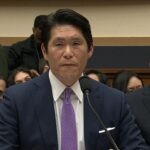
Published September 19, 2023
Glenn Youngkin won Virginia’s gubernatorial election in 2021 in large part due to education policy. Parents fed up with how public schools handled Covid-19, the Black Lives Matter movement and increasingly salient LGBT issues were open to conservative critiques of the K-12 education system.
Youngkin’s general election opponent, former Virginia Gov. Terry McAuliffe, may have sealed his fate with one line in a gubernatorial debate: “I don’t think parents should be telling schools what they should teach.”
On September 8, Youngkin pardoned Scott Smith, a Virginia dad arrested at a school board meeting in 2021 while seeking answers about his daughter’s sexual assault on school property, suggesting Youngkin, at least, still sees a political advantage in pushing the topic.
Republicans’ commitment to prioritizing parents’ rights — the idea that the ultimate authority for children’s education rests with their parent — continues to drive much of the conversation around K-12 public education. And in many states, increasing numbers of parents are opting out of the traditional public education system.
As someone who wrote a report for Congress on expanding school choice, I’m heartened by this momentum. But Republicans are on delicate footing in this new world of educational choice and parents’ rights, and they need to be as concerned about execution as about principles. After three years of turmoil and change, the next phase of advancing parents’ rights and school choice will need to focus less on pushing an ambitious revolution and more on successfully administering those changes that have been introduced.
In the past year, Arkansas, Florida, Indiana, Iowa, Oklahoma, Ohio and Utah created or expanded programs that allow parents to use state funds to pay for non-public education for all or nearly all students. Other Republican-controlled states have expanded school choice programs more incrementally, with additional growth on the horizon. EdChoice, a leading school choice advocacy organization, called 2023 “the year of universal school choice.”
These victories will thankfully expand the options for many parents. But they are not yet set in stone. Democratic Arizona Gov. Katie Hobbs, for example, has tried to rescind some of her Republican predecessor’s sweeping school choice legislation, which includes universal scholarship accounts for parents to use at private schools or other untraditional options.
To solidify their gains, conservatives who have championed the school choice revolution must shift their focus to ensuring that their new policies can be executed well, or they will open the door to further efforts to erode them.
Already, stories are popping up about parents stretching the bounds of universal educational scholarships by using the money to purchase kayaks, pizza ovens and large trampolines for “educational purposes.” Too many stories like this may undermine support for these accounts.
Enforcing common-sense guardrails around how these dollars can be spent can ensure parents use the system as intended and avoid some of the more egregious headlines coming out of the new programs.
Similarly, some states that have expanded school choice have very limited means of making that choice accessible, especially in states with heavily rural populations. Critics fairly point out that “choice” in education is a meaningless concept if students can’t access any new options. States should consider a series of capacity-building grants to help new institutions get off the ground. They could also rethink their approach to school transportation services to make sure families can get their students to the institution that best matches their needs.
Part of the opposition to school choice rests on fears that private schools will underperform academically. Indeed, expanded choice will work best when coupled when some kind of assessment. As Ashley Berner, associate professor and director of the Johns Hopkins Institute for Education Policy, has stated, marrying choice and accountability is common globally.
“Most democratic school systems around the world build choice and quality into their design,” she writes. “This is called educational pluralism, and it is the norm in places as diverse as Canada, Sweden, Indonesia, Belgium, and Israel.” Ensuring that all schools receiving public funding are providing a quality education should be part of the conversation around expanded choice.
Advocates for school choice and parents’ rights would also do well to learn some lessons from the tea party. That movement tapped into genuine populist anger about the housing crash and financial crisis and sought to channel it toward long-standing conservative concerns about the size of government. But the movement’s unwillingness to compromise amid an ideological echo chamber helped push Washington toward political brinksmanship, which ended up undermining its long-term strategy.
At the same time, blue states face their own self-inflicted wounds, alienating some parents and pushing them to consider other alternatives. Groups like Moms for Liberty have seen success galvanizing parental opposition to policies around diversity and inclusion and transgender issues, opening a total of 285 chapters across 44 states, one of the founders told PBS earlier this year.
Their movement has been fueled by stories like that out of Montgomery County, Maryland, where a public school district is seeking to bar parents from being able to opt out of having their children engage with required books that go against the parents’ religious values, such as on gender, sexuality and LGBT issues. In an amicus brief, my colleagues at the Ethics and Public Policy Center argue the idea that schools should be able to overrule parents’ concerns flies in the face of the First Amendment: The “ideology advanced by the School Board is radically at odds with Christian anthropology,” they say, and “substantially burdens [parents’] religious exercise and constitutional rights.”
Any Republican education agenda will always prioritize safeguarding parental rights against infringement like that seen in Montgomery Country. But doing so effectively will depend on being responsive to criticism around accountability and academic achievement to show that giving parents more power strengthens our education system and offers a viable alternative to the brittleness of heavy-handed administration in places like Montgomery County.
The parents’ rights and school choice movements aim to improve students’ academic, social and moral formation. That won’t automatically follow from a few policy wins. The new landscape for K-12 education will require the kind of studied, technocratic approach that doesn’t necessarily garner applause on a debate stage but is essential to making the permanent and lasting change conservatives would like to see.
Patrick T. Brown is a fellow at the Ethics and Public Policy Center, a conservative think tank and advocacy group based in Washington, DC. He is also a former senior policy adviser to Congress’ Joint Economic Committee.
Patrick T. Brown is a fellow at the Ethics and Public Policy Center, where his work with the Life and Family Initiative focuses on developing a robust pro-family economic agenda and supporting families as the cornerstone of a healthy and flourishing society.












